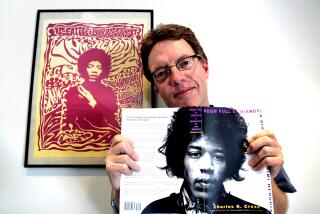Hendrix revelations on the way
- Share via
SEATTLE — Jimi Hendrix might have stayed in the Army. He might have been sent to Vietnam. Instead, he pretended he was gay.
And with that, he was discharged from the 101st Airborne Division in 1962, launching a musical career that would redefine the guitar, leave other rock heroes of the day speechless and culminate with his headlining performance of “The Star-Spangled Banner” at Woodstock in 1969.
Hendrix’s subterfuge, contained in his military medical records, is revealed for the first time in Charles R. Cross’ new biography, “Room Full of Mirrors.” Hendrix always claimed he was discharged after breaking his ankle on a parachute jump, but his medical records do not mention such an injury.
In regular visits to the base psychiatrist at Ft. Campbell, Ky., in spring 1962, Hendrix complained that he was in love with one of his squad mates and that he had become addicted to masturbating, Cross writes. Finally, Capt. John Halbert recommended him for discharge, citing his “homosexual tendencies.”
Hendrix’s legendary appetite for women negates the notion that he might have been gay, Cross writes. Nor, Cross says, was his stunt politically motivated: Contrary to his later image, Hendrix was an avowed anti-communist who exhibited little unease about the escalating U.S. role in Vietnam.
He just wanted to escape the Army to play music -- he had enlisted to avoid jail time after being repeatedly arrested in stolen cars in Seattle, his hometown.
“Room Full of Mirrors,” titled after an unreleased Hendrix tune, is being published this summer to coincide with the 35th anniversary of his Sept. 18, 1970, death from a sleeping-pill overdose.
The new bio is culled from nearly four years of research, including access to Hendrix’s letters and diaries, along with military records provided by a collector the author won’t name. Cross focuses on Hendrix’s complex personal life and psyche more than his music. “It’s not how much I know about Jimi’s B-sides; it’s how much I know about the emotional arc of his life,” Cross said in an interview.
Before Hendrix even owned a proper guitar, he played air guitar using a broom, then a beat-up hunk of wood with a single string. When he was 16, his father bought him a right-handed electric guitar that Hendrix had to restring to play with his left.
After his discharge, Hendrix formed a band with former Army pal Buddy Cox and began touring Southern clubs, playing to black audiences with the King Kasuals and as a backup to Solomon Burke, Otis Redding, Curtis Mayfield and Little Richard.
Unable to make a living in the States -- primarily because of his color -- Hendrix went to England in 1966 and took London by storm with his blend of soul, blues and rock. Within eight days of his arrival, he floored guitar gods like Eric Clapton and Jeff Beck. Hendrix remained in London for nearly a year, forming the Jimi Hendrix Experience and releasing his first album.
On his way to the Monterey Pop Festival in summer 1967, he was mistaken for a bellhop by a woman at the Chelsea Hotel during a layover in New York.
It was a cold reminder of his ethnicity, Cross writes.
More to Read
The biggest entertainment stories
Get our big stories about Hollywood, film, television, music, arts, culture and more right in your inbox as soon as they publish.
You may occasionally receive promotional content from the Los Angeles Times.










